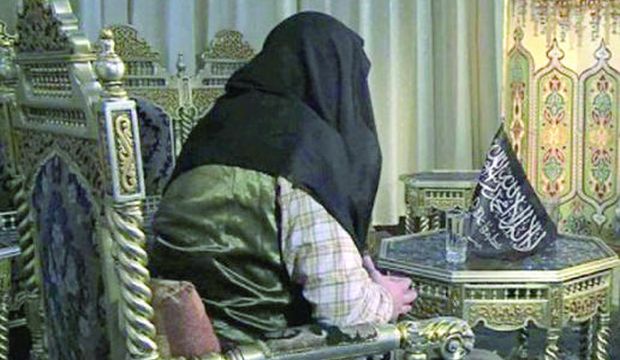
A screen-grab of Abu Mohammad Al-Golani taken from Al-Jazeera’s televised interview with him, which was aired on May 28, 2015. (Asharq Al-Awsat)
Cairo, Asharq Al-Awsat—Al-Jazeera’s televised interview with Abu Mohammad Al-Golani, the leader of the Al-Qaeda-affiliated group, the Al-Nusra Front, has stirred controversy across the Arab world. While some see the interview as a legitimate scoop for the Qatari-funded channel, others criticized it for giving a platform to an organization classified by many countries around the world, as well as the United Nations, as a terrorist organization.
The interview, broadcast on May 28 on Al-Jazeera’s Arabic-language channel, was held in an unknown location, and features the leader of Al-Nusra, which is currently fighting Bashar Al-Assad’s regime in Syria, speaking about the group’s goals in the country, and its future activities should it succeed in capturing a larger slice of Syrian territory.
Golani appeared with his face covered and with the camera angle pointed from behind him. Only the interviewer’s face was visible to the viewer.
Immediately following the interview being aired, media practitioners and ordinary people took to social media outlets and their columns to question Al-Jazeera’s decision, with many accusing the channel of providing an opportunity for the head of an organization that is accused of committing atrocities in Syria to air his views and promote his group’s ideology.
The video garnered some 35,000 hits within 24 hours of being posted on Al-Jazeera’s YouTube channel, with a Twitter hashtag, which in English translates to “Golani on Al-Jazeera,” trending widely on the social media site throughout the Arab world.
Syrian activist Yahya Hawa wrote on Twitter that Al-Jazeera “should be ashamed of itself in front of the Syrian people” after airing the interview, while Abdulrahman Al-Lahim, another activist, called it an attempt by the channel to “polish the image of the terrorist Al-Nusra Front and Golani.”
Speaking to Asharq Al-Awsat, Farouq Abu Zeid, a media professor at Cairo University, was also highly critical of the channel for airing the interview, accusing it of contravening accepted media norms and standards.
“The whole principle of interviewing the leaders of terrorist organizations is a crime when considering the legal side of things, and is totally unacceptable according to international media standards and agreements, in addition to the fact that the [Arab League’s] Media Charter forbids incitement to violence [on television],” Abu Zeid said.
But others have praised the channel for airing the interview, and said it was important for the public to know and understand what organizations such as the Al-Nusra Front actually want in order to successfully counter their ideology on a wider scale.
“I see it [the interview] as a scoop for Al-Jazeera,” wrote Palestinian political analyst Yasser Al-Za’atara. “An even more important scoop would be an interview with [Abu Bakr] Al-Baghdadi,” the leader of the Islamic State of Iraq and Syria (ISIS), he said.
Abu Zeid, however, has little time for this point of view, and accuses Al-Jazeera of “going down a road no-one wishes to travel” and offending a large slice of the Arab street, as well as, conversely, unwittingly promoting such groups to those who may already be sympathetic with them.
He said: “A media or journalistic scoop is when you are able to obtain something legal which no other outlet was able to get . . . Whilst this is an unwritten rule in the media world, it is a universally accepted norm. Conducting interviews with leaders of terrorist organizations can have the effect of turning them into global stars or heroes. Because there are others among his [Golani’s] supporters, or those who wish to join [his organization], who already consider him a hero.”
He added that Al-Jazeera was attempting to “score cheap points” to give itself a name in the world of international media.
This is not the first time Al-Jazeera has been accused of giving a platform to leaders of terrorist organizations and of promoting itself by obtaining exclusive access to such figures. In the early 2000s, the channel was catapulted to international notoriety and became a household name throughout the world after airing videos obtained of then-Al-Qaeda leader Osama Bin Laden.
Abu Zeid’s colleague at Cairo University, Professor of Journalism Mahmoud Alam Al-Din, echoed Abu Zeid’s view of the interview, calling it “unacceptable.”
He made reference to the channel’s alleged support for organizations that have been banned in some countries as terror groups, such as the Muslim Brotherhood—which Egypt, Saudi Arabia, and the UAE among other countries have banned as such—as well as its past airing of Bin Laden’s speeches.
“Britain, for example, bans the appearance on television of anyone who leads a terror organization . . . What Al-Jazeera aired can be classified as incitement to violence and providing a kind of legitimacy to this killer [Golani] . . . The interviewer dealt with him as if he was simply a normal man and not a killer,” Alam Al-Din told Asharq Al-Awsat.
Also replying to those who considered the interview a legitimate media scoop, he said: “Can giving a platform to terror organizations be considered a scoop?” maintaining that “the concept of the ‘scoop’ will soon lose its meaning for the viewer, in light of this lack of impartiality [by Al-Jazeera].”
